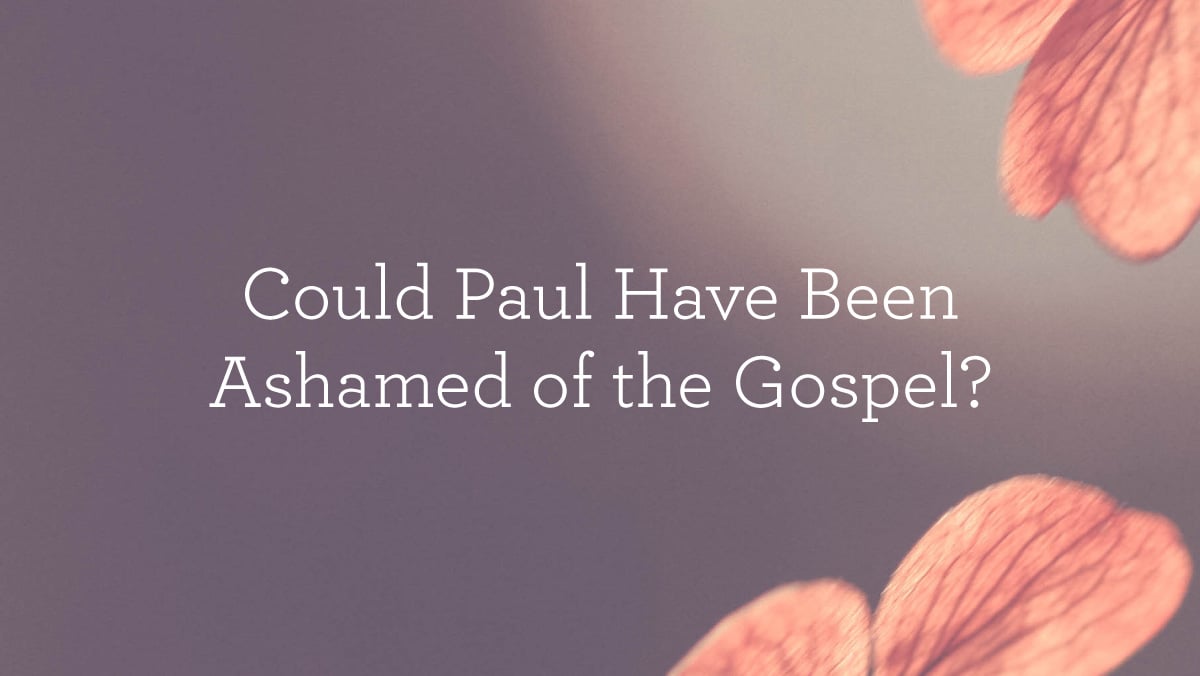
At the beginning of his correspondence to the Roman church, in Romans 1:16, Paul says something that is surprising in its implications: “I am not ashamed of the gospel.”
Paul the apostle, ashamed of the Gospel? It hardly seems possible! In fact, many preachers and commentators will say that what Paul means is “I’m passionately excited about the Gospel,” with the same understatement with which John Lennon might have been able to say, “I’ve written a song or two.” Could such a man as Paul really have faced the temptation of being ashamed of the Gospel?
But we shouldn’t treat Paul like an angel among men, free from the temptations that assail us. The reason Paul denied feeling ashamed of the Gospel is because shame was a real possibility he faced. And we face it too.
The Bold Apostle, a Timid Man
Paul knew what it was to be fearful. Indeed, he describes his entry into Corinth like this: “I was with you in weakness and in fear and much trembling” (1 Cor. 2:3).
Paul probably didn’t get up in the morning, look at himself in the mirror, and say, “Corinth, here I come! I’m sure you can’t wait to see me and to hear from me.” No, his attitude might have been something closer to “I don’t know if I can do this.” He may have thought about his retreat from Damascus (Acts 9:23–25), or about his years of silence (Gal. 1:16–17), or his beatings and imprisonments and shipwrecks (2 Cor. 11:21–27). Paul had much to look back on with fear from a human perspective.
Alongside his own background was Paul’s keen awareness of what the Gospel was to outsiders: “a stumbling block to Jews and folly to Gentiles” (1 Cor. 1:23), a dangerous superstition to be mocked and persecuted rather than a serious idea to consider. Whether to be ashamed of the Gospel was a real question because people really treated it as something shameful.
Yet in God’s eyes, things are different. Far from being shameful, the Gospel, Paul wrote elsewhere, is “the power of God and the wisdom of God” (1 Cor. 1:24). Indeed, “it is the power of God for salvation to everyone who believes” (Rom 1:16), as he reminded the Romans.
When Paul was confronted by the shaming of the world, he must have said, “I have reason for shame when I think about my life. I have reason for shame when I look at myself and my gifts. But there is one thing I have no reason to be ashamed of, shameful as it may seem to outsiders: the Gospel of Jesus Christ.”
“The Power of God”
We shouldn’t pass over this thought too quickly, because if we’re honest with ourselves, we’ll find that we’re often ashamed of the Gospel. Such shame is not just for new Christians, not just for laypeople; it also creeps in for lifelong, maturing believers and ministers of God’s Word too.
When it comes down to the crunch and someone asks, “What is this stuff about Jesus?” we may feel their eyes burrowing into our heads as we begin to answer. We just know they’re asking themselves, They can’t really believe that, can they?
When we go into a syncretistic, pluralistic world with the message that “there is no other name under heaven given among men by which we must be saved” (Acts 4:12), we face the inevitability of contempt and mockery. This sort of reality was exactly why Paul felt the need to insist that the Gospel is not a thing to be ashamed of.
What should motivate us to face the contempt of the world? It should certainly not be confidence in our own ability to sell a difficult message. Rather, it should be a conviction about the message itself. This Gospel about the man who died on a cross to forgive our sins and bring us to God “is folly to those who are perishing but to us who are being saved it is the power of God” (1 Cor. 1:18). We ought to learn to say, like the disciples who stayed with Jesus after His hard sayings, “To whom shall we go? You have the words of eternal life, and we have believed, and have come to know, that you are the Holy One of God” (John 6:68–69).
The Gospel is not something for us to be ashamed of, whatever shame the world may heap upon it, because by faith we can see God’s power at work in it to bring new birth and sanctification. Many today will try to dress up the Gospel in modern thinking to suit contemporary tastes. But we don’t need to exercise all our energy trying to create the right kind of context for the Gospel or trying to make the Gospel look a little better. What we need is confidence in the power of the Gospel itself and the God to whom it draws us.
The Gospel is not ultimately the presentation of an idea. It is the operation of God’s power. There is much about ourselves that we should doubt and much that we might be ashamed of. But as we encounter the contempt of the world for the cross of Jesus Christ, we may say with Paul, “Say what you will, but I will not be ashamed of the Gospel, for it is the power of God.”
This article was adapted from the sermon “The Power of the Gospel” by Alistair Begg.
Topics: Articles
